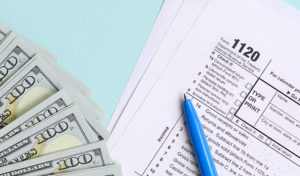For most organizations, tax season is one of the most stressful times of the year. Homeowners associations are no exception. Here is what you need to know about HOA tax returns.
Do You Have to File HOA Tax Returns?
Many homeowners associations operate with the incorrect assumption that they don’t have to pay taxes or file tax returns. This misconception typically comes from the idea that HOAs are nonprofit corporations. But, nonprofit does not automatically equate to tax-exempt.
Does an HOA have to file a tax return? Generally speaking, homeowners associations do have to file tax returns and pay taxes. Even if an HOA does not owe any taxes, a tax return is still necessary.
The Internal Revenue Service does not recognize HOAs as tax-exempt organizations. That being said, an association may attempt to achieve tax-exempt status, though there are several requirements. It is also not easy to get the approval of the IRS.
In addition to federal tax returns, homeowners associations also need to file state tax returns. Each state will have its own tax laws that apply to HOAs, so it is best to consult a tax professional in your state for help.
 HOA Taxes: IRS Form 1120 vs Form 1120-H
HOA Taxes: IRS Form 1120 vs Form 1120-H
There are two types of tax return forms available to homeowners associations: Form 1120 and Form 1120-H. Between the two, Form 1120-H is the common choice among associations. An HOA can choose to file either form and can switch between forms from one year to another, provided it complies with the requirements of the form they pick.
What Is Form 1120?
Form 1120, also known as the U.S. Corporation Income Tax Return, is a form designed for domestic corporations. This includes HOAs. But, Form 1120 is not very popular among associations for two reasons.
First, Form 1120 is labor-intensive. Completing this form involves more work, so it takes a lot of time and effort. Associations have to provide a plethora of detailed information, some of which are not available to them. It also requires HOAs to maintain more comprehensive bookkeeping. This is particularly hard for smaller associations or those that do not employ a management company.
Second, Form 1120 makes any leftover income automatically taxable. If the association has surplus income that it does not spend, it is immediately subject to taxation, even if the HOA chooses to deposit the funds into its reserves.
What Is Form 1120-H?
Form 1120 H is a tax return form that the IRS designed specifically for homeowners associations. Compared to Form 1120, Form 1120-H is significantly easier to complete because it is more straightforward. There is also less risk involved when HOAs file this form because they are not audited alongside other non-HOA corporations.
Additionally, using this form, HOAs can take advantage of certain tax benefits. The major benefit is that HOAs can exclude exempt function income from their gross income. That means the exempt function income is not taxable. According to the IRS, exempt function income consists of membership dues, fees, or assessments from homeowners or unit owners.
Not all homeowners associations can file Tax Form 1120 H, though. To qualify for this form, an HOA must meet the following requirements:
- 60% of the HOA’s gross income for the tax year must be comprised of exempt function income;
- 90% of the HOA’s expenses for the tax year must be comprised of expenses dedicated to obtaining, building, maintaining, caring for, and maintaining its property; and,
- Individual owners or shareholders cannot profit from the HOA’s net earnings unless by obtaining, managing, caring for, building, and maintaining association property or by a refund of surplus membership dues, fees, or assessments.
It is worth noting, though, that Form 1120-H has a higher tax rate — at 30% (and 32% for timeshare associations). In comparison, Form 1120 has a taxable rate of 15% on the first $50,000 of net income. The common advice is to compute the final tax owed according to both forms and choose the one that ends up costing lower in taxes.
Consequences of Not Filing HOA Tax Returns
 Must an HOA file tax returns? Yes. But, what happens when an HOA fails to do so?
Must an HOA file tax returns? Yes. But, what happens when an HOA fails to do so?
A homeowners association that fails to pay its taxes or file tax returns will likely face a monetary penalty. The penalty for failure to file is 5% for each month the return is late, with a maximum penalty of 25%. The penalty for failure to pay is 0.5% for each month the tax owed remains unpaid. Unlike the penalty for failure to file, the penalty for failure to pay does not have a maximum amount. It continues to add up until the HOA settles its unpaid taxes in full.
Additionally, the IRS charges interest on any unpaid tax owed. The interest rate tends to change every now and then, so there is no concrete amount or percentage.
What Is Form 1099-MISC?
Form 1099-MISC is a tax form used to report miscellaneous income. This typically means any non-employee income such as rentals. Homeowners associations must send a 1099-MISC form to every vendor or contractor to whom the HOA paid at least $600 in rental fees. Common examples include office spaces or land spaces, equipment rentals, and other types of rentals. The form, though, is not necessary if the HOA paid the rental fees to a professional property manager.
What Is Form 1099-C?
Form 1099-C is a form used to cancel a debt. It usually does not apply to homeowners associations unless an HOA wishes to forgive a homeowner’s unpaid dues or fees.
Some associations threaten homeowners with Form 1099-C. While it does cancel the owner’s debt to the association, it also notifies the IRS that the HOA has stopped collection efforts. The IRS will then consider it as income, which will result in the homeowner having to pay a higher personal income tax. This might push the owner to negotiate with the HOA on settling the delinquent fees.
Of course, this collection tactic probably won’t work in states where there is no personal income tax. Furthermore, there may be consequences to this strategy. As such, HOAs should always check with their attorney. It may be better for the association to simply attach a lien to the delinquent owner’s property.
Frequently Asked Questions
Does an HOA have to pay HOA tax?
Yes, a homeowners association does have to pay taxes and file tax returns. Even if an HOA is organized as a nonprofit organization, that doesn’t mean it is exempt from taxes. Only those officially recognized by the IRS as a tax-exempt organization are free from this responsibility.
What is the difference between exempt and non-exempt income?
Exempt income is income that is directly related to the association, such as HOA dues or special assessments. Non-exempt income is income that an association earns that doesn’t typically fall under the services it ordinarily provides. In other words, it is income that does not come as a direct result of HOA operations. Good examples include dividends, rental income, and usage fees for common facilities.
When is the due date for HOA tax filing?
In general, the deadline for filing Form 1120-H is the 15th day of the 4th month following the end of the tax year. However, if an HOA’s fiscal year ends on June 30, then it must file by the 15th day of the 3rd month following the end of the tax year. Associations may file for an extension (Form 7004) to extend the deadline. It is worth noting that HOAs can file their homeowners association taxes on the next business day if the due date falls on a weekend or legal holiday.
Does an HOA have to pay state taxes?
Every state has different tax laws and filing requirements. Some states require associations to file a tax return, while others don’t. It is best to consult a tax professional or accountant in your state to understand your state-level tax obligations.
Professional Help
Many HOA boards dislike dealing with HOA tax returns because they can be a major source of frustration and confusion. The best way to save yourself the headache while settling your taxes and tax returns on time is to hire an accountant or an HOA management company.
Clark Simson Miller provides expert assistance with taxes for homeowners associations and other management companies. Call us today at 865.315.7505 or contact us online to learn more!
RELATED ARTICLES:
- 8 Commonly Asked Questions About HOA Taxes
- What Does IRS 528 Say?
- Why Do You Need An HOA Audit? What Is It For?


 HOA Taxes: IRS Form 1120 vs Form 1120-H
HOA Taxes: IRS Form 1120 vs Form 1120-H